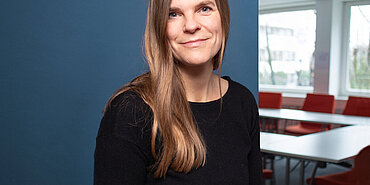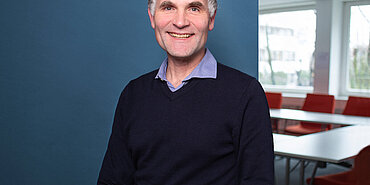The Japanese delegation focused on qualification concepts for youth work professionals as well as approaches for the promotion of out-of-school youth work and the strengthening of non-governmental stakeholders in the youth sector. During the Koblenz visits, the Japanese guests were particularly interested in endeavours designed to empower young people. The exchange programme will be continued in the spring of 2015: from 23 February to 10 March, experts from Germany, Denmark, and Great Britain will visit Japan by invitation of the Japanese Cabinet Office.
Kensuke Harada gives the impression of having lived in Germany for quite a while. The young Japanese says "Prost “ when the delegation enjoys a glass of spritzer with lunch, and he knows that the local soccer club, TuS Koblenz, plays in the fourth division. But in actual fact, he only arrived with the delegation six days ago. The 27-year-old has founded "YouthCreate“, a non-governmental organisation with which he intends to motivate young people in Japan to vote and actively participate in national politics. According to a poll conducted by the Japan Youth Research Institute, some 68% of Japanese pupils do not believe that they could change society.
Kensuke Harada has a very different view: "I believe in the innovative power of young people. It is difficult to increase the voice of young people in Japan but I would like to try," he says when asked what motivates him in his work and how the programme in Germany would motivate him even further. Within the framework of the programme, the group of nine has come into contact with various means of enabling societal participation of children and young people. During the nine days, they learn that participation is one of the basic principles of organised youth work in Germany, alongside a voluntary attendance, self-organisation, and that most staff members are volunteers. The participation principle is put into practice first and foremost by formalised participation committees within individual organisations, and also as a part of political policy making. In Koblenz, the delegation learns about the Youth Services Committee, which includes representatives of the youth office as well as representatives of voluntary organisations such as the Municipal Youth Council and the Youth Parliament.
More power through codetermination and participation
The Youth Parliament is a municipal parliament for 10-to-17-year-olds. Just like the grown-up version, the Youth Parliament holds public meetings and runs projects and elections. The young delegates in effect represent the interests of under-age citizens in a number of municipal committees, with regard to politics and administration. Our Japanese guests very much appreciated learning about the Koblenz Youth Parliament and talking with representatives of the Youth Parliament in Berlin Tempelhof-Schöneberg: they are committed to initiating comparable projects in Japan to give more power to the voice of young people.
The Youth Councils, the umbrella organisations for youth associations and organisations, also regard themselves as a voice for children and young people. The young Japanese professionals taking part in this seminar visit both the Federal Youth Council in Berlin and the Koblenz Municipal Youth Council. They ask the latter for its political legitimisation. "At the Municipal Youth Council, we tend to raise awareness of the importance of youth work and the need for creating favourable frameworks, especially the provision of sufficient funding for projects and personnel," said Margret Sundermann of "Fachstelle Plus für Kinder- und Jugendpastoral Koblenz", a church-based service for youth pastoral care, youth work and youth service. Madoka Moriyama is particularly interested in working at such a political level. Within the NGO "Teach For Japan", the 25-year-old is responsible for PR and negotiations with local government representatives and companies in the Kyushu region. "I'd heard that there are many social workers in Germany, and I am interested to learn how they champion and present their youth work to the public, and how they work in cooperation with local authorities." Maiko Komi, initiator and president of the NGO "MIRAIS Work", is most impressed with the structure of umbrella organisations in Germany. She is planning to set up similar structures within the next two years in Niigata, the rural region where she lives. "If we work together and build supportive structures, we will be able to achieve so much more in the future."
Participation is also a huge priority at the Koblenz youth office. "Participation is one of our most important buzz words. Children are always included, even outside of formal organisational settings," says Mr Muth of Koblenz municipal youth office. The Japanese visitors are keen to learn exactly how and where the children are able to voice their opinions. In some places in Japan, they had set up letterboxes where children could leave comments, but they were looking to find better ways for an exchange of views. They learn that the children's and young people's organisations in Koblenz like to use a method called "Zukunftswerkstatt", a "creative workshop for the future". This is a process of participation in which creative means are used to reach a collective decision.
Once the services on offer more strongly reflect the needs of children and young people, there might be more young volunteers wanting to become involved in this sector. Visiting the Koblenz Red Cross Youth, the delegation is impressed to find so many youths and young adults getting involved with helping people in emergency situations. "How do you manage to achieve this?" they ask Heike Nick, the section leader. Some children and young people find their way to the Red Cross through the school first aid service or via a first aid course. Rebekka, for example, took a first aid course when she was 14 years old, then joined as a volunteer, and is now turning her hobby into a profession: she is currently training as a paramedic. Others join because their parents are Red Cross volunteers, as is the case with Rebekka's family: the entire Nick family is involved. Daughter Sophie runs the youngest-members group together with Rebekka. To give their honoured guests an idea of what their meetings are like, Rebekka, Sophie, and their young charges hold a quiz and perform a role-play with casualties and first aiders.
A lasting effect
Delegation leader Hiroyuki Sakai is pleased with the additional knowledge he gained during the programme in Germany. In Japan, he runs a facility that uses outdoor activities to promote environmental education and personal development for children and young people. He has been to Germany on an IJAB-programme before, about 47 years ago. That particular trip had strongly influenced his professional life because, immediately afterwards, he became immersed in youth work and in time set up several organisations. The delegation leader is impressed by the enormous variety of services on offer and by the self-sufficiency of the German child and youth services. "In Japan, youth work is fragmented. In 2009, a law for the promotion of child and youth services was passed and ever since, the various ministries involved have endeavoured to cooperate with each other," says Sakai. He says that the law created a framework for the youth sector in Japan, but so far is only vaguely instilled in the actors' consciousness and is nowhere near enough included in the implementation of activities and services offered to young people. "To what degree out-of-school youth work in Japan can be strengthened and made more professional is largely dependent on the young child and youth services professionals and their commitment to the young people of Japan," said the delegation leader. "Qualifying measures like the Young Core Leaders of Civil Society Groups Development Program are therefore all the more important." The programme enables the participants to enter into an exchange with international colleagues and learn about best practice examples, which they can then develop to suit Japanese requirements.
Qualifications for stronger out-of-school youth work
Qualifications for full-time and voluntary staff members are of the utmost importance for the development of out-of-school youth work, on a par with the establishment of umbrella organisations for non-governmental stakeholders. At the Catholic University of Applied Sciences Berlin and Koblenz University of Applied Sciences, the Japanese guests gained an insight into the concepts of training and further education for social and youth work in Germany. They were keenly interested when told that, as a result of the academization process of the past 40 years, social work and related professions had greatly increased their standing within German society, and followed on with numerous specific questions designed to help them further develop their own system of qualifications: What are the most important considerations for a university when developing new study courses? What content and modules can be included? How do you select cooperation partners? How do you identify topics for further education courses?
Both universities also presented cooperation projects with hands-on organisations. The delegation was impressed by the cooperation between the Catholic University of Applied Sciences Berlin and the Vorstieg Institute of the "Sozialdiakonische Arbeit Berlin", a church-based institute for research and further education, and the "Alte Schmiede", a youth and community centre offering a wide variety of services for families under one roof. The result was a concept for the promotion of management competencies for staff working in youth facilities without fixed membership.
Professional and intercultural exchange
Aside from the professional exchange, there was an intercultural exchange. IJAB had organised host families for the final part of the program, with whom the Japanese were invited to stay for a day. "When they first met, both parties were very reserved and didn't know how to communicate. But the following day, they all arrived for dinner at Ehrenbreitstein Fortress with beaming faces and were communicating any which way they could," says Arshaluys Noramiryan who looked after the delegation in Koblenz.
Kensuke Harada experienced German student life in a house in Koblenz shared by three social work students. He says they talked a lot about the education system and youth policy. His conclusion: "Young people in both countries should be given more power. I promised myself to provide me with more participation opportunities." This sounds like someone who has the power and the will to lead the young people of his country. Almost 3,300 people are already following this spirited young man from Tokyo on Facebook.





